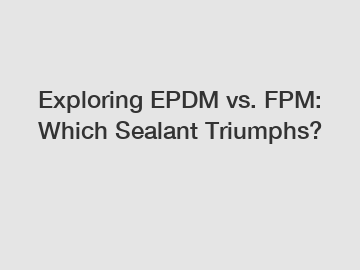Jan. 30, 2024
Automobiles & Motorcycles
Goto SBT to know more.
Sealants play a critical role in countless industries, ensuring that materials remain sealed, protected, and durable. From automotive to construction, the choice of sealant material can significantly impact the overall performance and longevity of a product. When it comes to EPDM (Ethylene Propylene Diene Monomer) and FPM (Fluorocarbon Rubber), professionals often find themselves seeking the best option. In this blog post, we will delve into the characteristics, applications, and advantages of both EPDM and FPM sealants to determine which one triumphs.
EPDM Sealants: Versatile and Reliable.

EPDM offers a plethora of advantages, making it a highly favored sealant material across various industries. Its exceptional resistance to weather, sunlight, and ozone makes it a top choice for outdoor applications like roofing membranes and automotive weatherstripping. EPDM also exhibits excellent resistance to acids, alkalis, and many polar solvents.
One of the primary reasons for EPDM's popularity is its ability to withstand a wide temperature range, from -45°C to 150°C (-49°F to 302°F). This makes it suitable for applications that require flexibility and stability in extreme climates. Moreover, EPDM is known for its excellent electrical insulation properties, making it ideal for electrical enclosures, cable insulation, and connectors.
FPM Sealants: High Performance in Harsh Environments.
FPM, commonly known as Viton® or fluoroelastomers, is a synthetic rubber that offers remarkable chemical resistance, especially against fuels, oils, solvents, and acids. This attribute makes FPM an excellent choice for applications in the automotive and aerospace industries, particularly in fuel systems and engine components.
Apart from chemical resistance, FPM sealants excel in high-temperature applications, withstanding temperatures ranging from -20°C to 205°C (-4°F to 401°F). This elevated temperature capability allows FPM to maintain its sealing integrity even in extreme conditions, such as hot engines or industrial processes.
EPDM vs. FPM: A Detailed Comparison.
While both EPDM and FPM sealants possess distinct advantages, certain factors may influence the choice between the two.
1. Chemical Resistance: FPM sealants outperform EPDM in terms of resisting harsh chemicals, including fuels, oils, and acids. If your application involves exposure to such substances, FPM becomes the clear winner.
2. Temperature Range: EPDM exhibits a wider temperature range than FPM, giving it an edge in applications that require flexibility in extreme climates. If your application involves high temperatures, FPM may be the more suitable option.
3. Aging and Durability: EPDM generally offers better weather resistance and anti-aging properties compared to FPM, making it highly reliable in outdoor applications. EPDM's longer lifespan and resistance to UV radiation make it a go-to choice for roofing and construction projects.
4. Cost Considerations: EPDM is typically more cost-effective than FPM, making it an attractive choice for budget-conscious projects without compromising quality performance.
5. Application Specificity: Each sealant has its niche applications. When selecting between EPDM and FPM, consider the specific demands of your project, such as resistance to chemicals, weathering, temperature fluctuations, and expected lifespan.
Conclusion:
In the battle between EPDM and FPM sealants, there is no clear victor. EPDM excels in terms of temperature range, overall durability, and resistance to aging and weathering, making it the go-to choice for outdoor applications. On the other hand, FPM stands out for its exceptional chemical resistance and high-temperature capabilities, making it indispensable in industries dealing with aggressive chemicals and extreme heat.
Ultimately, the choice between EPDM and FPM boils down to the unique requirements of your project. Evaluating factors such as chemical exposure, temperature extremes, weathering, and budget constraints will guide you towards the most suitable sealant material.
Regardless of your choice, it is crucial to procure sealants from reputable suppliers and ensure proper installation to maximize their effectiveness. Consult with experts in the field to ensure the best sealant is chosen for your specific application, ensuring longevity, reliability, and overall project success.
You can find more information on our web, so please take a look.
The company is the world’s best rubber oil seal from china manufacturer supplier. We are your one-stop shop for all needs. Our staff are highly-specialized and will help you find the product you need.
If you are interested in sending in a Guest Blogger Submission,welcome to write for us!
All Comments ( 0 )